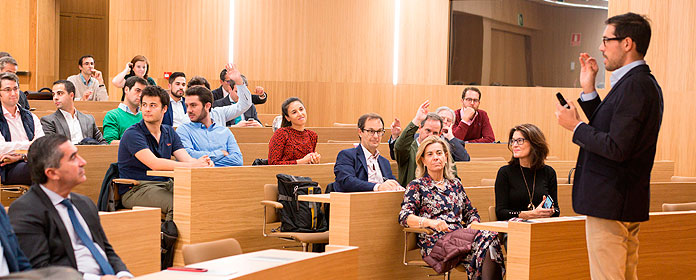Juan Galiardo, director of Uber Spain: "We understand mobility as a service".
The manager of the business of transport with driver (VTC) reflects on the future of the company and passenger transport in a training session for alumni at the headquarters of the University in Madrid.

When, in 2009, entrepreneurs Garrett Camp and Travis Kalanick founded Uber in Silicon Valley (San Francisco, USA), they did not just launch another technology company. Nine years after its birth, Uber has become one of the absolute protagonists of the present and future of the transportation industry. Its emergence has revolutionized the sector, and its avant-garde business proposals are convincing more and more users around the world.
In the opinion of Juan Galiardo, director of Uber in Spain, "the paradigm shift" sought by this company "is to understand mobility as a service". Galiardo reflected on the future of the multinational and passenger transportation during a lecture, at the framework of the Career Experience program for alumni, organized by Career Services and Alumni-University of Navarra.
Galiardo joined Uber in 2014 as part of the operations team, and during this time he has experienced first-hand the evolution of a company that today operates in 600 cities around the world (eight of them Spanish) and makes 15 million trips a day. Its growth is reflected in the value it has achieved in the market. In recent days, the specialized press has reported that Uber's stock market debut could be valued at 120 billion dollars (around 103 billion euros). This is an example of how far the new Economics can go in the society of the future.
Galiardo admitted that, with more than 1 billion cars circulating in the world's cities, "urban transport based on private vehicles is unsustainable". Precisely under this premise Uber was born, a private transportation services platform that in Spain operates under licence VTC (vehicle transport with driver). Through an app, customers contact the drivers registered in the service, and are transferred in their vehicle. Through this app, users can also track the location of their reserved car. But this is only the initial service of a company that has seen its business portfolio grow in just a few years.
Cultural changeUber's managers immediately opted for shared vehicles and developed Uber Pool: through the app, users can share the trip they are about to take with people who are on the same urban route. " We have helped to improve the efficiency of transportation in cities," says Galiardo. The advantages are many: there is no need to park or wait for cabs or buses, and the expense, being shared, is minimal. But Uber is not satisfied and wants to expand these new habits to other areas. "Cars should be to Uber what books are to Amazon. That is to say, the starting point for the development of the business," said director of Uber Spain.
In this sense, Uber, like other companies such as Airbnb or Wallapop, is generating a profound cultural change. The technologicaldevelopment is the common denominator of this new Economics, which demonstrates the extent to which the world is changing at an astonishing speed. In these times marked by turbulence, social, educational, relational and labor models have been questioned.
That a service like Uber, which does not own any vehicles, is capable of creating such a profound disruption in the transportation industry and of putting the system in check is a magnificent example of the drastic transformation that most economic sectors are going through.
The idea, in the future, is for Uber to be a great aggregator of mobility alternatives around the city, according to the profile and preferences of Username. In other words, to expand the business beyond the passenger transportation app. And the possibilities are immense, as demonstrated by the multitude of services that the multinational has developed or has in mind for the coming years: autonomous vehicles, JUMP (shared electric bicycles), UberONE (premium chauffeur service with 100% electric cars), UberEats (the leading food submission service based on Uber technology)... or UberAIR, a kind of air cab for people that will begin to make its first flights in Los Angeles in 2020 with the goal to reduce congestion and the time passengers are in circulation, in addition to contributing in the long deadline to reduce greenhouse gas emissions. As Galiardo admits, "Uber's start-up was very difficult, but it seems that little by little we are seeing light at the end of the tunnel." And the future is yet to be written.




